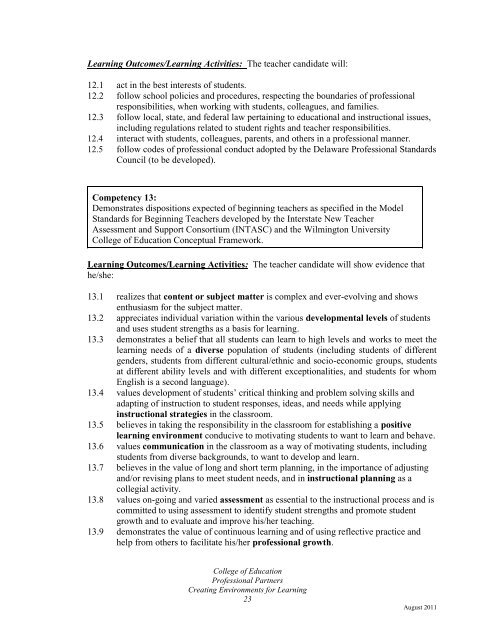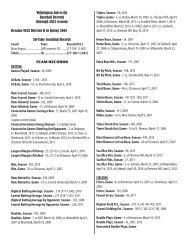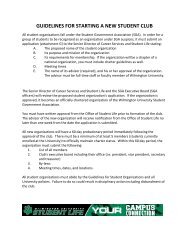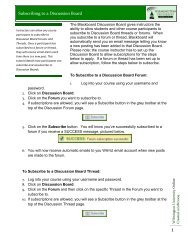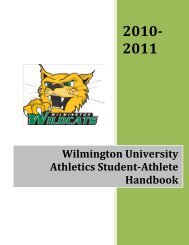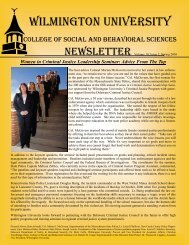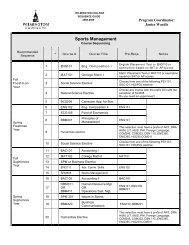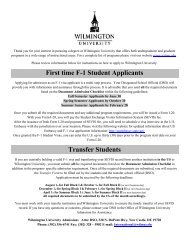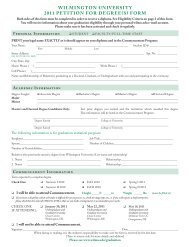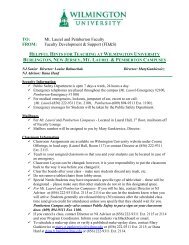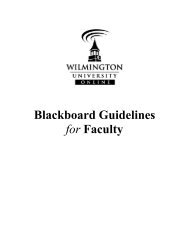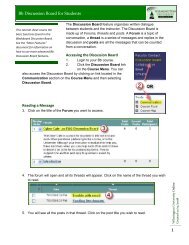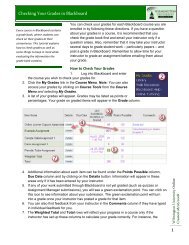handbook for cooperating teachers - Wilmington University
handbook for cooperating teachers - Wilmington University
handbook for cooperating teachers - Wilmington University
Create successful ePaper yourself
Turn your PDF publications into a flip-book with our unique Google optimized e-Paper software.
Learning Outcomes/Learning Activities: The teacher candidate will:12.1 act in the best interests of students.12.2 follow school policies and procedures, respecting the boundaries of professionalresponsibilities, when working with students, colleagues, and families.12.3 follow local, state, and federal law pertaining to educational and instructional issues,including regulations related to student rights and teacher responsibilities.12.4 interact with students, colleagues, parents, and others in a professional manner.12.5 follow codes of professional conduct adopted by the Delaware Professional StandardsCouncil (to be developed).Competency 13:Demonstrates dispositions expected of beginning <strong>teachers</strong> as specified in the ModelStandards <strong>for</strong> Beginning Teachers developed by the Interstate New TeacherAssessment and Support Consortium (INTASC) and the <strong>Wilmington</strong> <strong>University</strong>College of Education Conceptual Framework.Learning Outcomes/Learning Activities: The teacher candidate will show evidence thathe/she:13.1 realizes that content or subject matter is complex and ever-evolving and showsenthusiasm <strong>for</strong> the subject matter.13.2 appreciates individual variation within the various developmental levels of studentsand uses student strengths as a basis <strong>for</strong> learning.13.3 demonstrates a belief that all students can learn to high levels and works to meet thelearning needs of a diverse population of students (including students of differentgenders, students from different cultural/ethnic and socio-economic groups, studentsat different ability levels and with different exceptionalities, and students <strong>for</strong> whomEnglish is a second language).13.4 values development of students’ critical thinking and problem solving skills andadapting of instruction to student responses, ideas, and needs while applyinginstructional strategies in the classroom.13.5 believes in taking the responsibility in the classroom <strong>for</strong> establishing a positivelearning environment conducive to motivating students to want to learn and behave.13.6 values communication in the classroom as a way of motivating students, includingstudents from diverse backgrounds, to want to develop and learn.13.7 believes in the value of long and short term planning, in the importance of adjustingand/or revising plans to meet student needs, and in instructional planning as acollegial activity.13.8 values on-going and varied assessment as essential to the instructional process and iscommitted to using assessment to identify student strengths and promote studentgrowth and to evaluate and improve his/her teaching.13.9 demonstrates the value of continuous learning and of using reflective practice andhelp from others to facilitate his/her professional growth.College of EducationProfessional PartnersCreating Environments <strong>for</strong> Learning23August 2011


